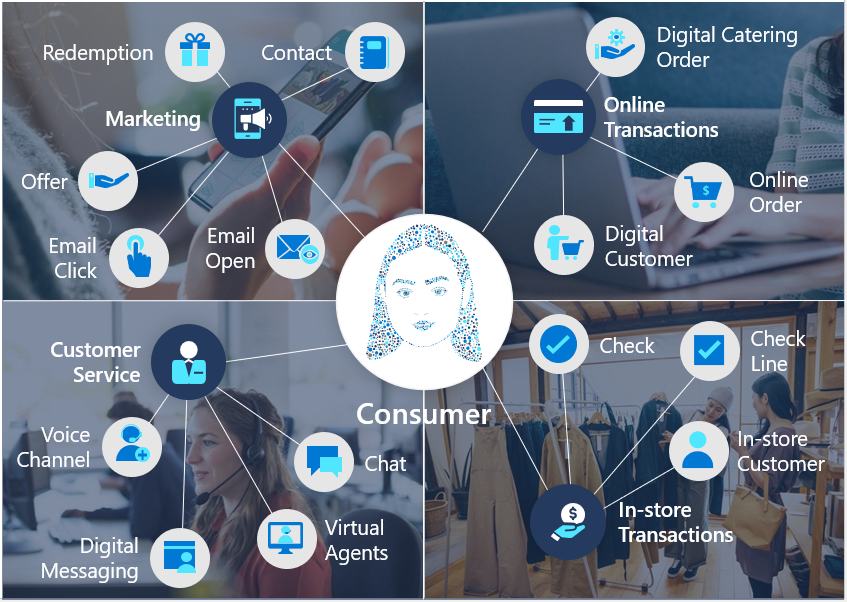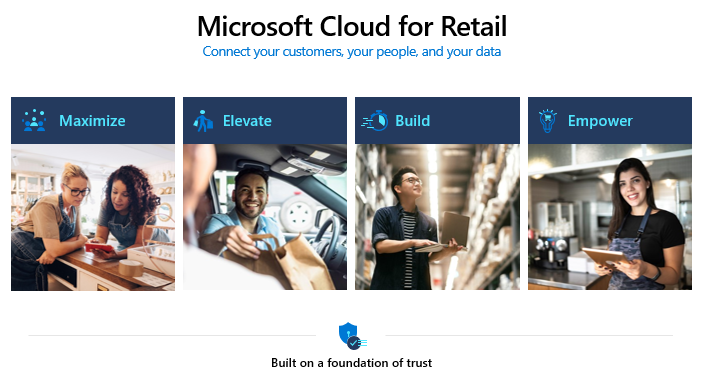Introduction
Microsoft Cloud for Retail provides capabilities to help you manage retail data at scale. Additionally, it helps make it easier for retail organizations to improve the customer experience and drive operational efficiency, while helping support security, compliance, and interoperability of retail data.
The following sections explain how retail is currently in transition and how Microsoft Cloud for Retail is helping transform the retail journey.
Retail industry and shifting priorities
The retail industry is facing a few challenges trying to ensure the future of retail is meeting today’s consumer needs:
Personalization: Providing a personalized experience to customers can be difficult for retailers, especially for those organizations with a large customer base. It requires the ability to gather and analyze customer data, and then use that information to tailor the shopping experience to each individual customer.
Omnichannel integration: With customers using various channels to shop (for example, online, in-store, mobile), retailers must ensure that their systems are seamlessly integrated across all channels to provide a consistent experience.
Data management: Retail organizations need to be able to effectively manage and analyze large amounts of data to make informed decisions about their operations and customer experience. One of the greatest, challenges retailers face today is the need to unify data from disparate systems in order to gain insights from it. Fragmented retail point solutions drive data volume and complexity.
Inventory management: Retailers must be able to effectively manage their inventory to ensure that they have the right products available at the right time. This requirement can be challenging, especially in an era of fast-changing consumer demand.
Supply chain management: Retailers must be able to efficiently manage their supply chain to get products to customers in a timely manner. Various factors, including long lead times, unpredictable demand, and a complex network of suppliers complicates this requirement.
Consumer purchase habits : E-commerce is seeing a significant surge, becoming the primary driver of retail sales growth for the foreseeable future. Brand loyalty, however, is on the decline. Consumers are increasingly willing to switch brands, particularly in the food and grocery sectors, due to supply chain disruptions. Despite the continued popularity of in-person retail experiences, customer expectations are evolving. Shoppers now demand seamless experiences, whether they're shopping online or in-store.

What is Microsoft Cloud for Retail?
In response to the industry's focus on cloud services, Microsoft has prioritized the development of services that are specific to the industry. Microsoft Cloud for Retail is a collection of proven tools to connect your customers, your people, and most importantly, your data. AI capabilities in Microsoft Cloud for Retail help you increase productivity across various aspects of your business. It helps in building and analyzing your data, creating personalized shopping experiences for your customers, supply chain management, and store operations.
Microsoft Cloud for Retail accelerates business growth by providing trusted retail industry solutions that integrate with retailer’s existing systems. Through this complete set of retail specific capabilities across the Microsoft Cloud portfolio, in addition to partner solutions, it becomes possible to seamlessly connect your customers, your people, and your data.
Unify data for simplified management and app development
Microsoft Cloud for Retail brings together different data sources across the retail value chain and connects experiences throughout the shopper journey using capabilities from Dynamics 365, Microsoft 365, and Azure.
With Microsoft Cloud for Retail, you're using retail data models to bring multiple systems and applications together by providing a shared language for your applications. This approach helps simplify data management and app development by unifying data into common formats and applying consistency across multiple apps and deployments.
It starts by unifying disparate data sources across the end-to-end shopper journey, allowing retailers to maximize the value of their data, and resulting in one holistic view of the consumer. Once connected, AI can then reason over this unified data to help retailers better understand and elevate the consumer shopping experience with more relevant and streamlined experiences across the value chain. Retailers can more confidently build real-time supply chains, and associates can provide better shopping experiences.
Improve store operations and personalized shopping with application and copilot templates
Microsoft Cloud for Retail enhances customer service and experiences with the aid of industry-leading digital tools that facilitate superior selling strategies. Application templates available for store operations and personalized shopping extend and integrate with other line-of-business applications to enable custom solution scenarios. These templates provide seamless access to data within the workflow, eliminating the need for traditional methods like pen and paper or the inconvenience of toggling between multiple applications. This integration leads to more efficient operations and improved customer interactions.
A copilot is an AI-driven partner guided by an individual, in their own natural language, to amplify creativity and accelerate results, by turning all their data into knowledge. With copilot templates for retail specific scenarios, Microsoft Cloud for Retail opens doors to transform how people focus time on the workday. Technologies such as AI and machine learning, along with the capability to automate personal workflows and processes, and low-code solutions, significantly enhance human expertise and capabilities.
Customize and integrate for unique retail environments
Microsoft Cloud for Retail can be fully customized to each retailer’s unique environment and business processes. The modular capabilities can be adopted one-at-a-time based on the retailer’s needs while interconnected to make data accessible across the entire retail value chain. Microsoft Cloud technologies make it easy to integrate with retailer’s existing systems, specific to each retail organization’s need, driving increased top line sales, and improved operational efficiencies that lead to sustained profitability and meaningful growth.
Microsoft Cloud for Retail is built on a foundation of privacy, security, and regulatory compliance across Microsoft and the partner ecosystem. Microsoft Cloud for Retail is supported with retail industry-specific data models, APIs, and an ecosystem of partners that are purpose-built for retail-specific scenarios. Your customers and your data are vital to you, so it's imperative that you own and control it at every stage. Microsoft supports that ideal with identity and data privacy and security. Microsoft's approach includes protecting identities and endpoints, defending against threats, securing cloud infrastructure, protecting and governing sensitive data, and using integrated regulatory compliance tools.
Priority retail scenarios
Microsoft Cloud for Retail is an industry-specific cloud that introduces capabilities for retail customers across the following four key scenarios:

Maximize the value of your data - Retailers are challenged to unify vast and increasing amounts of data across various sources that don't necessarily communicate well with one another. Maximizing the value of your data is about unifying these data sources and increase data-driven productivity with AI driven data insights to realize greater value across your enterprise.
Elevate the shopping experience - Retail customers demand experiences tailored to their tastes and respect of their time and energy. Tools tailored for this scenario, along with hyper-personalisation using AI, help foster stronger customer relationships, increase online and offline cart size, and drive loyalty.
Build a real-time, retail supply chain - Currently, supply chain stability and agility are the most pressing frontiers for retail organizations around the world. As a result, Microsoft has core solutions that include AI to provide visibility across your entire supply chain and to predict and manage changes in supply and demand at all points.
Empower the store associate - Microsoft provides modern work solutions that help in collaboration and automation to manage burnout so that store associates can be as effective and empowered as possible. You can equip your retail workforce with AI based solutions to increase customer satisfaction while reducing the burden on your frontline and empowering your team's growth.
Featured retail capabilities
Retail capabilities are enabled through the four prioritized scenarios.
This module explains the capabilities around the scenarios and the solutions that support them.
